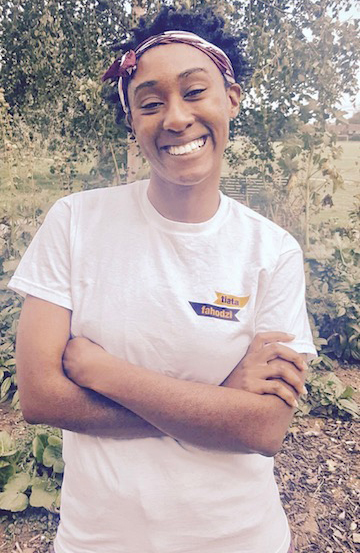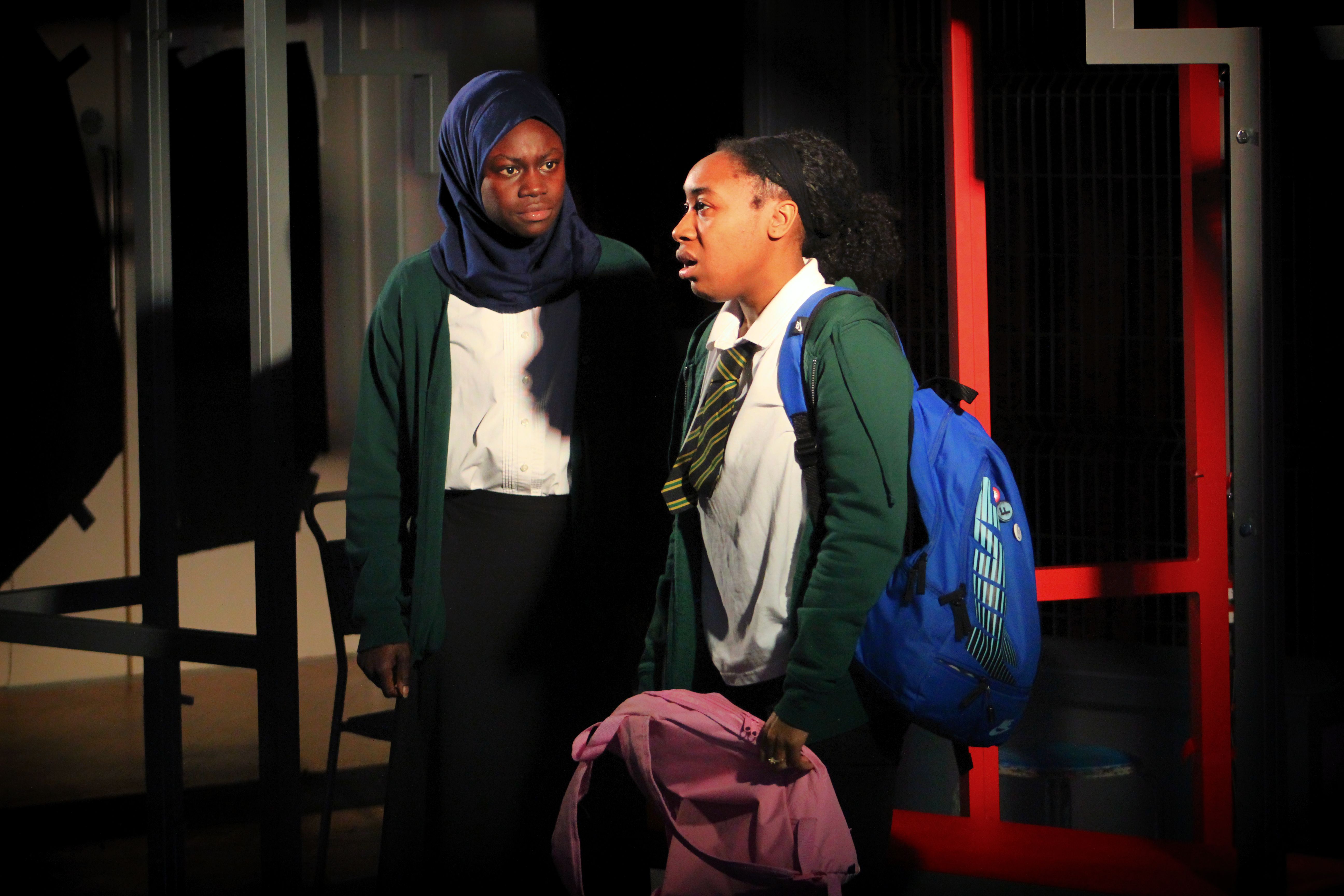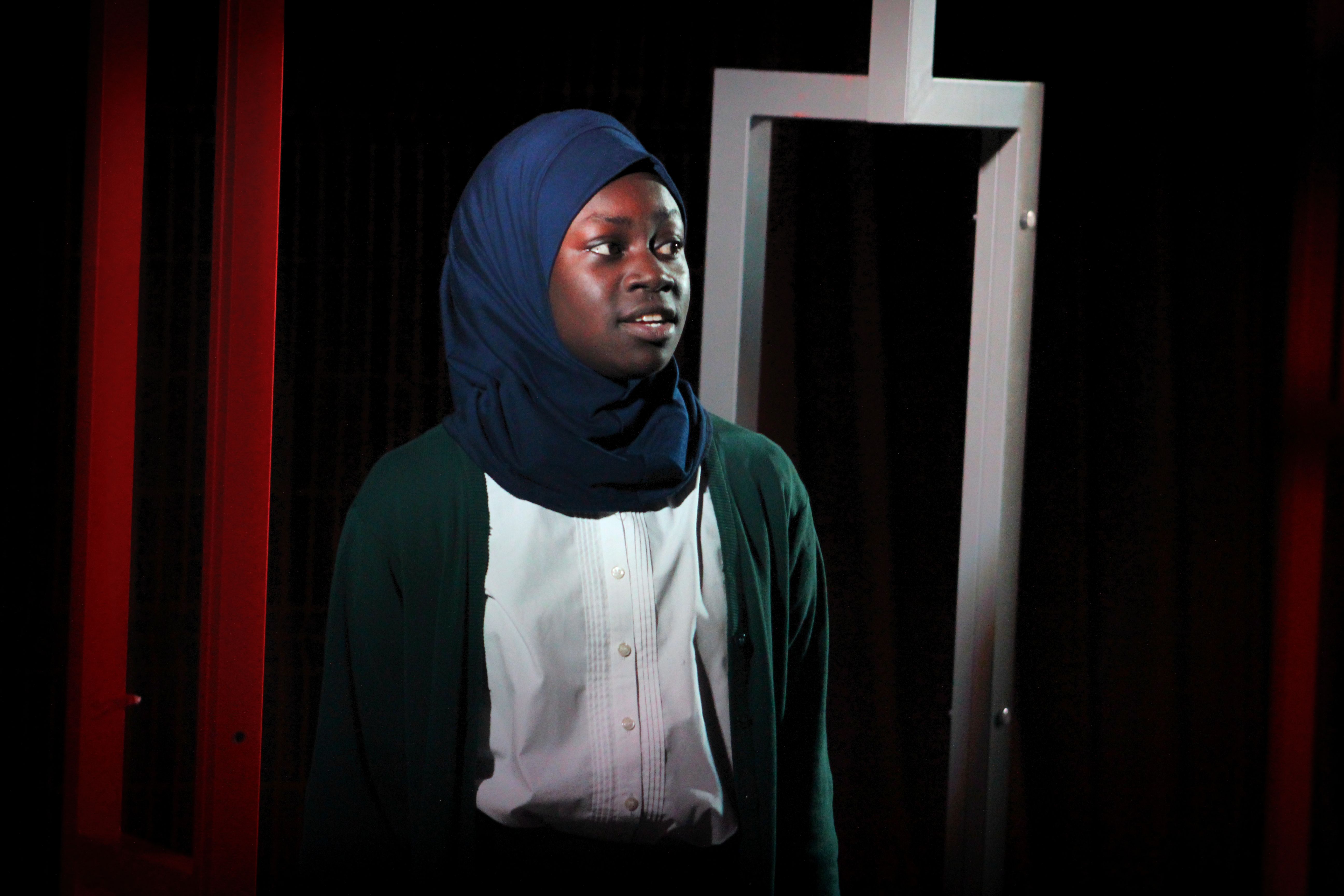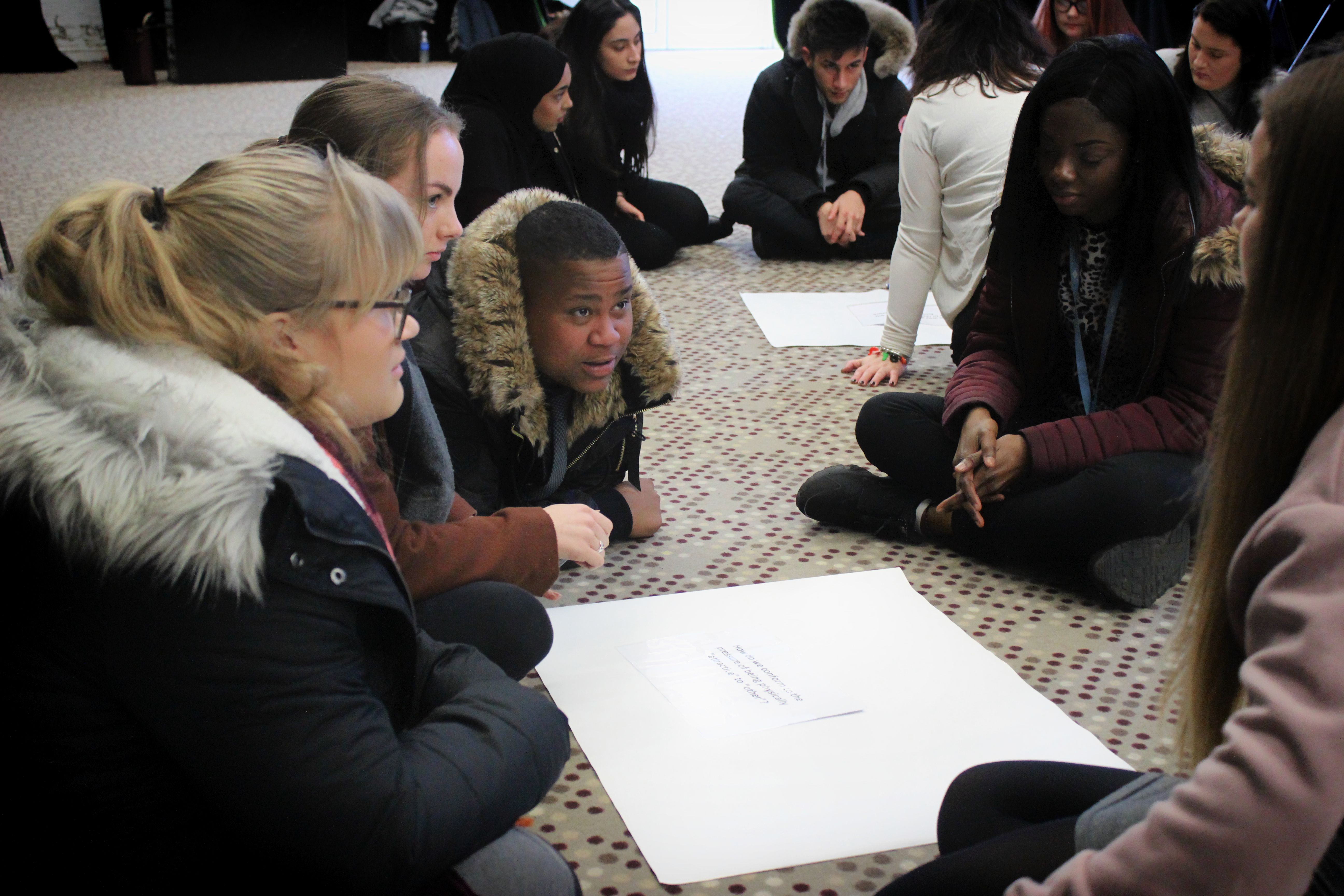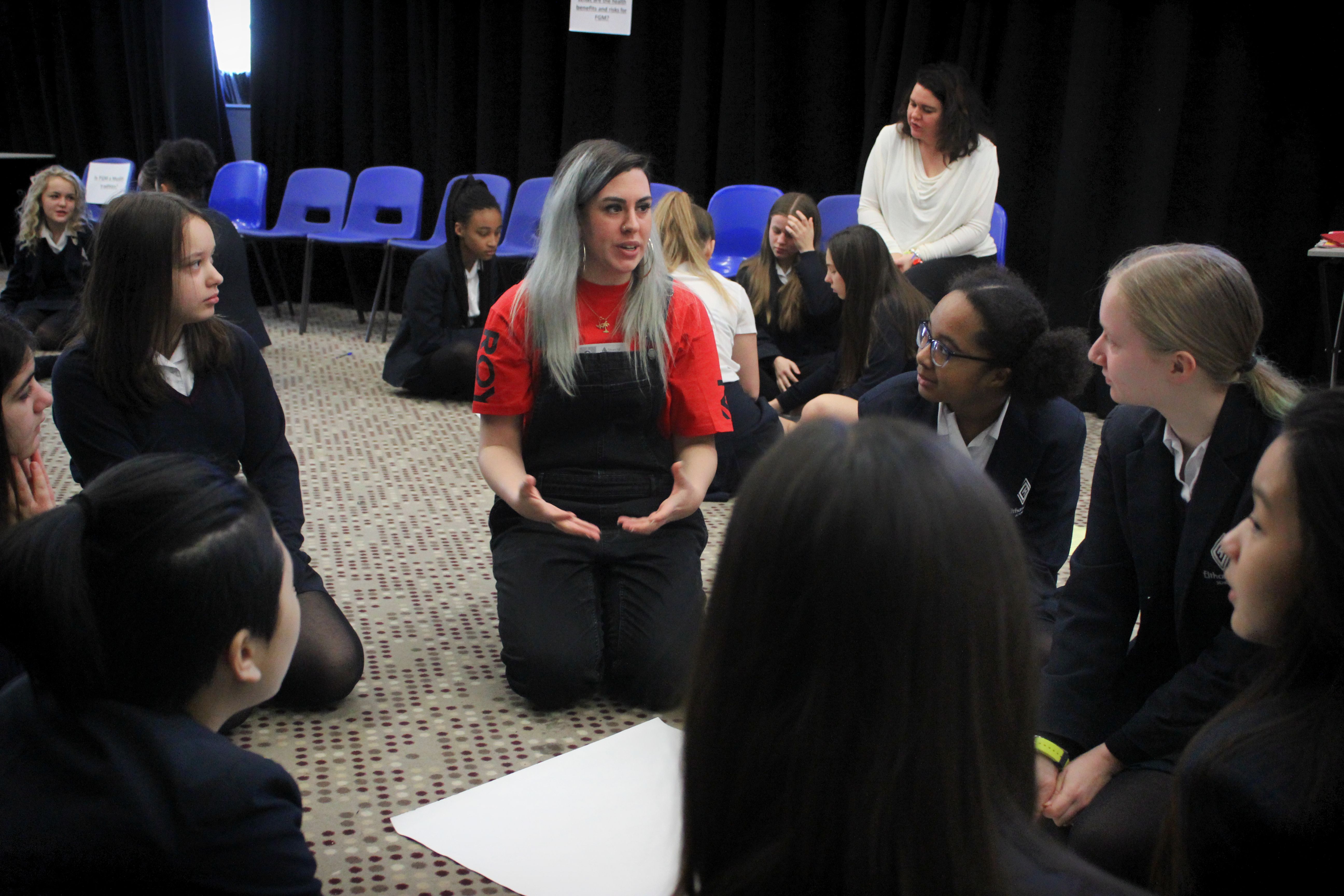The Royal Court Theatre is on a four-week secondary schools tour of Cuttin’ It, a play which tackles the urgent issue of Female Genital Mutilation in Britain. The tour will visit a number of schools across London and Birmingham until Friday 9 February 2018. It was written by Charlene James and is directed by Anastasia Osei-Kuffour. Winner of the George Devine Award for Most Promising Playwright and the Alfred Fagon Award for Best New Play, Cuttin’ It was performed at the Royal Court in 2016 as a Royal Court/Young Vic co-production with Birmingham Repertory Theatre, Sheffield Theatres and The Yard Theatre.
Each schools visit will involve a pre-show workshop followed by a post-show Q&A with the pupils led by Young Court. They have worked with the organisation Solace Women’s Aid for training sessions on FGM and have also been supported by Louise Williams, Clinical Nurse Specialist at the women’s division of University College Hospital, in order to fully prepare for the workshops.
Afridiziak Theatre News caught up with director Anastasia Osei-Kuffour to find out more about her role as director of this award-winning production and the impact Cuttin’ It is having on young people.
My focus was to make sure that the audience connected with both of the characters, and that the production didn’t in any way demonise the communities who have FGM as part of their culture
Firstly, tell our readers what Cuttin’ It is all about.
‘Cuttin’ It’ is about two teenage girls trying to live normal lives and yearning for true friendship despite the devastating impact of Female Genital Mutilation (FGM) on their lives. It’s about friendship, family and community and the various ways that FGM is thought of.
Due to the sensitivity of the subject matter, how did this have an impact on how you directed the play?
Charlene James, the writer, did a great job of crafting a play which presents a very human story. The script had all the ingredients needed in order to present the topic of FGM both in a sensitive and impacting way. My job was to present that clearly in the production and do the writing justice. My focus was to make sure that the audience connected with both of the characters, and that the production didn’t in any way demonise the communities who have FGM as part of their culture, but work to present the different views there are and a clear message of the terrible effect that FGM has on people.
You have progressed from assistant director to director for this production, what changes have been made and have there been any challenges that you’ve had to overcome?
The main challenge I faced was making myself look at the production anew; resisting any urge to arbitrarily copy decisions made in the previous production and exploring the play for myself in order to come to organic decisions of my own. It was important for me to look at it afresh because this was a new production for a particular audience. It helped that we had different actors to the previous production and a team who were happy to look at the play in a new way. The set is completely different and focusses more on the idea of two worlds colliding and intertwining to reflect the dynamic of the two girls and how their stories intersect.
It was great that I had assisted on the production before because I felt I really knew the play- I had a head start in understanding what the play was about.
Tell us about your involvement in bringing Cuttin’ It to schools.
The Royal Court led on this. While I was assistant director on the previous production, there were various conversations about there being another production of ‘Cuttin’ It’. I agreed that it would be great for it to have another life. I had meetings with the Royal Court where we talked about the possibility of a schools’ tour, and then months after the production ended the Royal Court succeeded in getting funding for the tour and asked me to direct it.
They have been really engaged, some have been really emotionally affected, a lot of them are really horrified about what FGM is and the fact that it happens in the world.
How have the secondary school pupils responded to the production?
They have been really engaged, some have been really emotionally affected, a lot of them are really horrified about what FGM is and the fact that it happens in the world. The production really resonates because the characters are teenagers like them, dealing with similar issues, liking the same music as them and therefore the aspect of FGM is one that really shocks them.
Moving on to your career as a director. How hard have you found this industry as a young black female director?
There’s many times I’ve felt alone, many times being the only black person in the audience or at a workshop. In the beginning I felt like I was a real outsider being a black, Christian, female, director and not seeing many people like me. It didn’t always feel like I had a place in the industry. However, that began to change as key people in the industry started seeing my potential and started opening up opportunities for me. I have the Young Vic to thank for their workshops, investment in young directors and their work to build a diverse directors network. At the same time as they were supporting me to learn and grow, they were also helping to develop the careers of other artists like me so that being part of the genesis network meant that I was increasingly seeing people like me at my experience level and above. That helped me to believe that I could achieve a career in this industry.
Congratulations on being selected as a trainee artistic director of Tiata Fahodzi. Could you tell us more about this experience and what we can expect to see from you in the near future?
Thank you. I feel privileged to be learning from Natalie Ibu, the artistic director and CEO of tiata fahodzi, who has a wealth of knowledge about directing, producing, and running a dynamic theatre company. As a black female artistic director and CEO, she is a real inspiration. For two years I get to learn, and begin to lead in various aspects of running a theatre company. I get to direct a show as part of my residency which I am excited to be thinking and preparing for right now, so you’ll be seeing that from me in the near future. I also get to take part in the Leaders of Tomorrow strand of the Artistic Director Leadership Programme – a programme designed to equip 30 theatre practitioners of colour with what is needed to become artistic directors in future. Getting this opportunity to be part of this network and professional development programme is a major blessing. It’s a step up for me so it’s also been challenging, and I’ve seen how much I’ve still got to learn in order to become the artist I want to be.
In the beginning I felt like I was a real outsider being a black, Christian, female, director and not seeing many people like me.
What tips would you give to a director starting out?
Go and see theatre – increase your knowledge of what is out there and be inspired. Connect with theatres: take part in their schemes and programmes, get to know the decision makers within the organisation – ask to meet with the artistic director and talk about your aspirations. Assist, assist, assist. I found it a great help to assist more experienced directors, when I was starting out. It’s a great opportunity to learn and get a good insight into what it takes to get a show from the first day of rehearsal to the opening performance and to the end of the run. You also get to know theatre venues and the staff and artists that work there – as they get to know you and your work various opportunities can open up for you.Practice. Find actors who want to practice with you and try things out, work out how you like to work and what you like to do.
Are there any people that you’d like to mention that have helped you career-wise or you have been inspired by?
Yes, there’s a few, here’s some of them:
Lyndsey Turner – she led the introduction to directing course at the Young Vic which was the catalyst for me deciding to move from a career in law to a career in theatre. She took us through many aspects of directing, I got to try out some of the exercises she took us through and found that I not only enjoyed it but I could possibly be good at it. Sue Emmas, and the taking part team at the Young Vic – they opened up opportunities for me and supported me when I started and still do now. Gbolahan Obisesan [read interview] – he took me on as his assistant director on ‘Cuttin’ It’, it was great to learn from him and he recommended that I direct the schools’ production, which I am so grateful to have been able to do. Natalie Ibu – she’s opened the door for me to be part of the Artistic Director Leadership Programme which is having a great impact on my development as a theatre practitioner. I am currently learning a great deal from her.I am really inspired by debbie tucker green, who I greatly admire for creating such powerful, dynamically written plays, and being such a strong writer and director.
This year, Afridiziak Theatre News, celebrates its 10th anniversary. What are some of the African-Caribbean theatre productions or highlights that have stood out for you over the last ten years?
Well I started pursuing a career in theatre in 2012 and that’s when I began watching a lot of theatre. So, over the past five years some of the shows that have stood out for me are: ‘The Suit’ (2012) [read review] at the Young Vic: such beautiful storytelling, singing and staging. ‘The Scottsboro Boys’ (2014-2015)[read review] at the Young Vic: this moved me deeply, the story of these young black boys wrongly accused of rape is heart-breaking and it was told in such a dynamic and well envisioned way- great music and performances. ‘A Man of Good Hope’ (2016) this was powerful, lively and brilliantly performed by the world renowned South African Isango Ensemble. The singing and dancing were awesome, such a great experience to be in the audience. ‘A profoundly affectionate, passionate devotion to someone (-noun)’ (2017) [read review]: Debbie Tucker Green’s production at the Royal Court was really moving and full of emotion, it explored relationships in such a powerful way. I loved the staging and the writing.
Related Links
The Royal Court Theatre announces a secondary schools tour of Cuttin’ It, written by Charlene James and directed by Anastasia Osei-Kuffour
2014 Alfred Fagon Awards – Charlene James wins Best New Play of the Year with her powerful drama Cuttin’ It






















